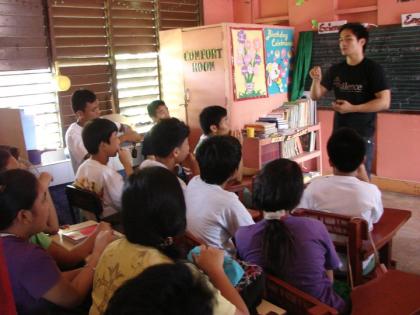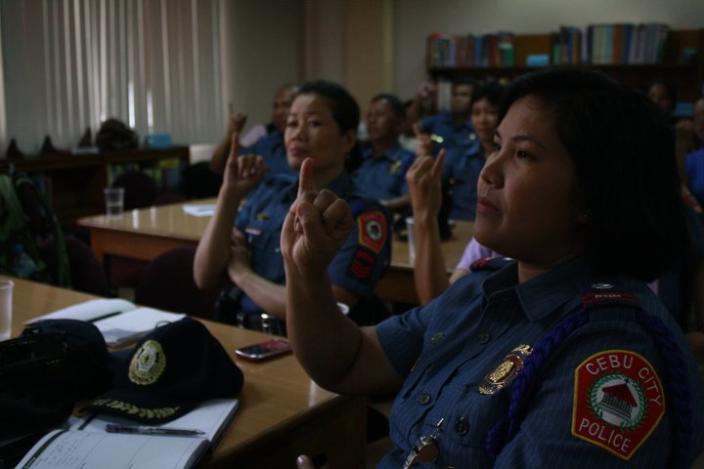Deaf children prone to sexual abuse, says NGO
By Nestor B. Ramirez, VERA Files
CEBU CITY—A nongovernmental organization working to prevent sexual abuse among Deaf children has recorded six cases of rape in June, the highest incidence on a per-month basis since it started documenting the problem last year.
But catching the perpetrators and filing cases against them in court is difficult because law enforcers and prosecutors could not communicate with victims, some of whom are unaware that what happened to them was rape.
The Cebu-based Gualandi Volunteer Service Program (GVSP) has been documenting and assisting in the filing of cases related to the sexual abuse of Deaf children as part of "Break the Silence" (BTS), a project the group launched in January 2011 after it discovered high instances of sexual abuse among people with hearing disabilities.
Of the six rape cases reported in June, suspects in only three cases have been charged in court, said GVSP program manager John Paul Maunes.
Since the launching of BTS, GVSP has intervened in at least 20 cases of sexual abuse against the Deaf, with 10 cases already filed in court.
Maunes said rape was the most common abuse among female victims and sexual advances by gays among male victims.
GVSP has adopted the vision of a "Deaf-inclusive Filipino society" through the volunteering program of the Gualandi Mission for the Deaf. It is part of the BTS network started by the Stairway Foundation that advocates children's rights.
A nationwide survey by the Philippine Deaf Resource Center (PDRC) in 2005 found that 65 to 70 percent of Deaf boys and girls are being molested. Of the 60 Deaf respondents in Manila and Cebu, one of three women has been raped.
Maunes said, however, the number of Deaf persons being abused could be higher than what the study pointed out. He said most of the victims did not know that they were already being abused until family members discovered the incidents.
One victim, for example, did not know she had been raped until she complained of stomachache and the doctor found out that she was six months pregnant.
GVSP, which has held sexual assault prevention seminars in Central Visayas, also found that many Deaf individuals would only realize that they had been sexually violated when they attended the seminar.
In one seminar, a Deaf boy told Maunes that he did not know that the act of a gay man who paid to fondle his (the child's) sex organ already constituted sexual abuse.
In the case of rape victims, majority of them were never educated and cannot communicate using the standard sign languages taught in schools for the Deaf, Maunes said. Most of them could not even relate what happened and do not know how to affix their signatures on complaint sheets.
Before the GVSP project started, most of the sexual abuse cases against the Deaf were not addressed or ended up in settlement because government lacks experts to handle the cases, including police investigators who can communicate with the victims or families lost interest in pursuing the case, Maunes said.
Cebu is a case in point. SPO1 Bell Felisan of the Cebu City Police Office (CCPO) children's welfare desk admitted that they really have a hard time investigating if one of the parties involved is deaf. She cited one case where both the victim and the alleged perpetrator were both deaf, but no one among the police knew sign language.
This is also one of the issues raised by the PDRC study. The others are:
When the Deaf is arrested and there is no interpreter, the Deaf does not know why he is being arrested or what he is being accused of.
No interpreter is provided for the Deaf who is accused and imprisoned while the case is pending.
Deaf girls who are raped, and their parents, decide not to file the case but just settle amicably (accept money or payment). This happens mostly in preliminary investigations when there is no interpreter.
The Deaf is made to sign affidavits drawn up by the police. Affidavits are usually written in either Filipino, Bisaya or in English, and the Deaf don't understand what is written. Most of the time there is no interpreter to explain the affidavit to the Deaf.
Deaf victims have interpreters who cannot sign well or cannot sign at all. Some interpreters do not possess adequate skills to interpret for a court hearing.
Both Hearing and Deaf interpreters grapple with the legal jargon.
Male interpreters harass deaf rape victims. Some interpreters intimidate female offended parties during the court hearing.
Inappropriate appointment of male interpreters for female victims of rape and sexual violence.
Many deaf complainants and accused are poor and uneducated. There is a need for Deaf relay interpreters and a hearing interpreter, for unschooled or linguistically-isolated deaf parties.
Because the courts (judge, lawyers) do not know about Supreme Court Memorandum Order 59-2004 and the Office of the Court Administrator Circular No. 104-2007, the court asks the deaf to look for, and pay for, their own interpreter.
The Supreme Court memorandum authorizes the Court Administrator to act on requests of trial court judges to hire the services of sign language interpreters in cases where they are needed. The court is mandated to pay for the interpreters.
The memorandum from the Office of the Court Administrator lays down the guidelines to be followed on the payment of the services of a hired sign language interpreter.
For their part, Felisan said police officers have started training in sign language.
Maunes said social and cultural factors contribute to why most Deaf people do not know that they are already being sexually accosted. He said family members usually do not pay serious attention to problems brought by a Deaf member because of the latter's disability.
Because they were mostly neglected, the Deaf could not tell that sexual abuses are already being committed against them, he said.
In rural areas, families presume Deaf members could not be productive in society and would not prioritize their education, Maunes added.
Fr. Peter Miles Sollesta, GVSP president, said there are people who take advantage of the disabilities of others, which is why they are advocating training the Deaf on how to protect themselves.
Australian Ambassador to the Philippines Bill Tweddell said in a speech before Deaf students from different schools in Cebu on July 3 that GVSP's project practically gives voice to the Deaf. The Australian government is supporting the project.
(This story is part of Reporting on Persons With Disability, a project of VERA Files in partnership with The Asia Foundation and Australian Agency for International Development. VERA Files is put out by senior journalists taking a deeper look at current issues. VERA is Latin for true.)



